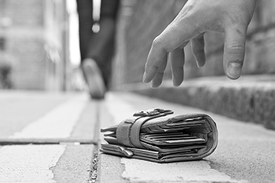Difference between revisions of "Identity Theft"
Drew Jackson (talk | contribs) |
|||
| (59 intermediate revisions by 6 users not shown) | |||
| Line 1: | Line 1: | ||
{{Scams to Avoid TOC}} | {{Law-Related ESL Badge | ||
|lessonname= Scams to Avoid Lesson Module}}{{REVIEWEDPLS | reviewer = [[People's Law School]]|date= March 2017}}{{Scams to Avoid TOC}} | |||
Someone has taken your name, your credit card information, and your Social Insurance Number (SIN), and they are pretending to be you. They’re running up steep bills, even committing crimes - and as far as your bank and the authorities are concerned, they '''are''' you. This is '''identity theft''', and it is one of the fastest growing crimes in Canada. | |||
==What is identity theft?== | |||
Identity theft happens when someone takes | Identity theft happens when someone takes your personal information - such as your name, address, date of birth, SIN, your bank account numbers, credit card information, or online passwords - and uses it to access your finances, make purchases in your name, or commit other crimes. For example, they might: | ||
* take money out of your bank account | |||
* make purchases using your credit card information | |||
* apply for a credit card or a loan in your name | |||
* sign up for a cellphone service in your name | |||
It is a criminal offence to possess someone else’s identification for criminal purposes, or to use it to commit a crime (such as impersonating someone or misusing a credit card). | |||
==How do they get the information?== | |||
{{PLSStorybox | |||
| image = [[File:Headshot_-_Scams_to_Avoid_-_Hazel_-_2017.jpg|link=]] | |||
| text = "I got a call from my credit card company asking if I had just bought something in New York. I’ve never been to New York. It turns out someone had been using my credit card for weeks, and run up $10,000 in charges. The police think she got my credit card information by pulling an old bill out of my garbage, and then she contacted the credit card company to change my address. I had wondered why I hadn’t received a bill for almost two months."<br>- Hazel, Williams Lake | |||
}} | |||
Identity thieves can obtain your personal information in many ways. Some might find a wallet or phone you lost, and take information from it. | |||
Some go through garbage or recycling bins for discarded bills or other mail with personal information on it. | |||
Some use technology to steal your information. For example, they pretend to be a reputable company and send fake emails or texts to trick you into providing personal and financial information. | |||
== | ==Warning signs== | ||
There are many signs that could indicate your personal information is being used by someone else. | |||
* On your bills or bank statements, you don’t recognize some purchases or withdrawals. | |||
* Bills or bank statements arrive late or not at all (they may have been redirected). | |||
* | * You're alerted by your bank or credit card company about suspicious transactions. | ||
* You start getting bills from companies you know nothing about. | |||
* | * A company or collection agency contacts you about a '''debt''' that isn’t yours. | ||
* | |||
* | |||
* | |||
=== | ==Consequences of identity theft== | ||
Being the victim of identity theft can be a complicated and frustrating experience. | |||
There is the immediate inconvenience of having to cancel cards and accounts and get replacements. | |||
There can be charges for purchases you didn’t make and services you didn’t order. If these purchases were made with a lost or stolen credit card, you shouldn’t be liable for any losses as long as you report the lost or stolen card immediately. | |||
As well, identity theft can result in a bad '''credit report,''' which could make it difficult for you to find employment, rent a place to live, or borrow money. See the section "[[If You've Been Scammed]]" for steps you can take to protect or repair your credit report. | |||
==Preventing problems== | |||
[[File:Scams_to_Avoid_-_Contents4.png|thumb|275px|right| link=| <span style="font-size:50%;">Image via www.istockphoto.com</span>]] | |||
Here are ways to minimize the risk of someone stealing your identity. | |||
===Protect your personal information=== | |||
Never give personal or financial information to anyone who contacts you by phone or online unless you know who they are or can confirm they are legitimate. Be extra careful about giving out your Social Insurance Number (SIN). It's virtually a key to your identity. | |||
===Handle your documents carefully=== | |||
Carry only the identification you need. Don’t carry your SIN card, birth certificate, or passport on a regular basis. Store them in a safe place and only carry them when you know you need them. | |||
Tear or shred receipts and copies of papers you no longer need, such as old tax returns, insurance forms, and credit offers you get in the mail. | |||
===Be cautious using email=== | |||
Be extremely wary of emails that seem to come from financial institutions or authorities asking you to provide personal information. If in doubt, look up their contact information, call them, and ask them to verify the request before providing any information. | |||
===Be cautious online=== | |||
On social networking sites, don't post more personal information than necessary. Set your privacy settings as high as possible. Don't accept friend requests from people you don't know. | |||
===Read your statements=== | |||
Read your bank and credit card statements. That way you'll know right away if you're being charged for something you didn't authorize. Report any missing mail or statements right away. | |||
{{Scams to Avoid Navbox}} | {{Scams to Avoid Navbox}} | ||
{{Creative Commons for PLS | |||
|title = Scams to Avoid | |||
|author = | |||
}} | |||
__NOGLOSSARY__ | |||
Latest revision as of 21:18, 25 April 2017
|
|
This page is used in the Scams to Avoid Lesson Module, a law-related ESL lesson for newcomers to Canada. |
| This information applies to British Columbia, Canada. Last reviewed for legal accuracy by People's Law School in March 2017. |
Someone has taken your name, your credit card information, and your Social Insurance Number (SIN), and they are pretending to be you. They’re running up steep bills, even committing crimes - and as far as your bank and the authorities are concerned, they are you. This is identity theft, and it is one of the fastest growing crimes in Canada.
What is identity theft?
Identity theft happens when someone takes your personal information - such as your name, address, date of birth, SIN, your bank account numbers, credit card information, or online passwords - and uses it to access your finances, make purchases in your name, or commit other crimes. For example, they might:
- take money out of your bank account
- make purchases using your credit card information
- apply for a credit card or a loan in your name
- sign up for a cellphone service in your name
It is a criminal offence to possess someone else’s identification for criminal purposes, or to use it to commit a crime (such as impersonating someone or misusing a credit card).
How do they get the information?
 |
"I got a call from my credit card company asking if I had just bought something in New York. I’ve never been to New York. It turns out someone had been using my credit card for weeks, and run up $10,000 in charges. The police think she got my credit card information by pulling an old bill out of my garbage, and then she contacted the credit card company to change my address. I had wondered why I hadn’t received a bill for almost two months." - Hazel, Williams Lake |
Identity thieves can obtain your personal information in many ways. Some might find a wallet or phone you lost, and take information from it.
Some go through garbage or recycling bins for discarded bills or other mail with personal information on it.
Some use technology to steal your information. For example, they pretend to be a reputable company and send fake emails or texts to trick you into providing personal and financial information.
Warning signs
There are many signs that could indicate your personal information is being used by someone else.
- On your bills or bank statements, you don’t recognize some purchases or withdrawals.
- Bills or bank statements arrive late or not at all (they may have been redirected).
- You're alerted by your bank or credit card company about suspicious transactions.
- You start getting bills from companies you know nothing about.
- A company or collection agency contacts you about a debt that isn’t yours.
Consequences of identity theft
Being the victim of identity theft can be a complicated and frustrating experience.
There is the immediate inconvenience of having to cancel cards and accounts and get replacements.
There can be charges for purchases you didn’t make and services you didn’t order. If these purchases were made with a lost or stolen credit card, you shouldn’t be liable for any losses as long as you report the lost or stolen card immediately.
As well, identity theft can result in a bad credit report, which could make it difficult for you to find employment, rent a place to live, or borrow money. See the section "If You've Been Scammed" for steps you can take to protect or repair your credit report.
Preventing problems
Here are ways to minimize the risk of someone stealing your identity.
Protect your personal information
Never give personal or financial information to anyone who contacts you by phone or online unless you know who they are or can confirm they are legitimate. Be extra careful about giving out your Social Insurance Number (SIN). It's virtually a key to your identity.
Handle your documents carefully
Carry only the identification you need. Don’t carry your SIN card, birth certificate, or passport on a regular basis. Store them in a safe place and only carry them when you know you need them. Tear or shred receipts and copies of papers you no longer need, such as old tax returns, insurance forms, and credit offers you get in the mail.
Be cautious using email
Be extremely wary of emails that seem to come from financial institutions or authorities asking you to provide personal information. If in doubt, look up their contact information, call them, and ask them to verify the request before providing any information.
Be cautious online
On social networking sites, don't post more personal information than necessary. Set your privacy settings as high as possible. Don't accept friend requests from people you don't know.
Read your statements
Read your bank and credit card statements. That way you'll know right away if you're being charged for something you didn't authorize. Report any missing mail or statements right away.

